- Home
- Vincent Trigili
The Enemy of an Enemy ltop-1
The Enemy of an Enemy ltop-1 Read online
The Enemy of an Enemy
( Lost tales of Power - 1 )
Vincent Trigili
Vincent Trigili
The Enemy of an Enemy
Prologue
I had to make it back to the ship before theyreturned. Most of my men were already dead. Those still alive weredoing all they could to hold off the aliens who were defeating us,giving me time to get a message out.
When we first arrived, we were sure thiswould be a boring mission. This expectation was shattered almostimmediately after we landed and began to deploy. Aliens poured outof the colony, waving swords and carrying shields. I do not knowwhat those shields were made of but our blasters could notpenetrate them. As they rushed our position we were forced intohand-to-hand combat with them. They proved to be clumsy and we wereable to hold our own for a short while.
Behind the initial rush of sword-wieldingaliens came others. These wielded thin energy weapons which theyfired with deadly accuracy and power. The addition of thesereinforcements was just too much for our squad. We were completelyoutnumbered and outgunned.
I slammed aside the airlock door as I rushedto the communication officer’s station. I really needed his skilland speed on this equipment now, but he was ripped to pieces beforemy eyes by one of the aliens who somehow did it without evertouching him. I had to banish that thought and get a message outbefore others fell victim to this trap.
“Greetings,” came a voice from the darkness.“I am glad you survived. We need you to do something for us.”
I tried hard to ignore the chills runningdown my back from that voice. “Never!” I called as I spun andopened fire with my blasters. Then he walked out of the darkness.He appeared to be an old man, impossibly old, yet somehow stillstrong and vibrant. He stood before me without a spacesuit, eventhough the gaping holes in our spaceship had vented the entireatmosphere leaving us essentially in a hard vacuum.
I must have fired a dozen times from each ofmy hand blasters, at nearly point-blank range. I could not possiblyhave missed, yet somehow he was able to ignore my shots. It was asif he was immune to them.
“No. You will now comply,” he said.
I felt my will slipping from my control; Itried hard to stop as I saw myself dropping my guns and reachingfor the communications controls. I listened in horror as I sent amessage, one obviously intended to lay a trap. I fought with all Icould to break free of whatever was controlling my body, but I wasutterly powerless.
“Thank you for your help; the trap isbaited,” he said as I felt my life slip away from me.
Chapter One
“All senior staff report to the conferenceroom for mission briefing,” came a call over the ship’sloudspeaker.
I had been serving on this ship for a whilenow, but this was our first serious mission since I joined thecrew. I did not know why the captain accepted my appointment to hissenior staff, but I knew that I must perform beyond expectations ifI wanted to stay. Some other senior staff members were unhappy withhis choice; partly because he passed over people they felt werebetter qualified, but mainly because I was an outsider to theirgroup.
This mission was very unusual for a ship ofthis caliber, and that seemed to make the crew uncomfortable. Therewas an almost tangible sense of unease everywhere I went on theship. That bothered me. I could not put my finger on the feelingbut it did not seem natural, and I did not like it when things werenot the way they should be.
The conference room had big double doorswhich, apart from their size, were completely unremarkable. Anhonor guard made up from the captain’s personal security forcesflanked the doors. Deep in the heart of the flagship there was verylittle chance of any security risks; the position was more one ofhonor than necessity here.
The honor guard was extremely dedicated totheir job and those who desired this position spent their entirelives working to achieve this high distinction. Only the best ofthe best were considered, and even then there was intensecompetition among those few for that position of honor. An outsiderlooking in might think they were statues; they did not even blinkas I passed them and entered the conference room.
In this room there was a large oval table. Ihad been told that the captain wanted a round table instead of thetraditional rectangle, but the room was too narrow to allow it. Idid not know if this was true, but it fit in with the captain’sdesire to encourage everyone to take part in these meetings. Theroom was barren except for the table, a few personal monitors, anda large viewing screen. The idea was to make sure that nothingwould distract anyone from the tasks and responsibilities given tous by the Emperor.
By the time I arrived everyone had alreadytaken his seat, with the exception of the captain who had not yetarrived. First on the right of the captain’s chair was the big andpowerful presence of Zalith. He was the Chief Tactical Officer ofthe Dragon Claw. His primary function on the ship was to lead themilitary operations and to advise the captain on all mattersreferring to weapons and combat. In addition, the infantry on boardreported directly to him and through him to the captain. Ifanything happened to the captain, he would assume command.
Zalith was a Zalionian, a member of areptilian race that was one of the first races to join the Empire.They made up the bulk of the military might of the Empire. Theirloyalty was without question, but they tended to favor a strongaggressive stance, and lived by the motto, “The best defense is anoverpowering offense.”
Zalith had served with the captain forseveral decades, far longer than any other member of the seniorstaff. Together they had served on countless missions, and as ateam they had never failed the Empire.
Seated next to Zalith was Dr. Rannor, Chiefof Medical Operations for the Dragon Claw and each of our supportvessels. In addition to that, he was in charge of any biologicalsamples that we collected or used as weapons. While his primaryfunction was handling the healing of our crew he, like all of us,was on the ship for one reason only: to crush the enemies of theEmpire. He had joined the staff about five years earlier when thefamous Dr. Smith retired.
Dr. Rannor, like most of the executive crew,was human. Humans founded the Empire in a time lost to history. Tothis day, humans tend to be found in all the key positions ofauthority throughout the Empire. Indeed, with the exception ofZalith the entire senior staff of the Dragon Claw was made up ofhumans.
My seat came next. I was the youngest memberof the staff; indeed, I was the youngest member of the ImperialNavy ever to serve on the captain’s senior staff. My youth was thereason that most of the staff did not fully trust my judgment. Ithink they saw me as a child trying to play an adult game.
Next to me sat Larath. He was the ChiefMorale Officer. Because of the vast distances and time involved inspace travel, people started to think of their ships as home, andtheir crewmates as family. This bonding proved to be verybeneficial, as it encouraged loyalty and sacrifice, yet at the sametime very troublesome for the Navy. From time to time fights wouldbreak out, or weddings occur. To handle this, the Empire determinedthat there needed to be a department whose job it was to handleinterpersonal issues. These issues ranged from homesickness tomental breakdowns, weddings and funerals. If it was a personalproblem, it fell in Larath’s department. Larath was also fairly newto the staff, but was a well-respected veteran of the fleet.
Commander Jones, Chief of Alien Relations, orhead diplomat, took the final seat. He was an expert in all alienpeoples and cultures. All peoples not part of the Empire wereconsidered to be aliens. It was his primary responsibility tohandle any and all contacts with the aliens, and to advise thecaptain on all matters relating to them. The captain specificallychose Commander Jones for his staff less than a year ago, but likeLarath he was a well-respected veteran.
The
captain, as always, arrived last. I hadbeen told he did this so the staff could talk before he arrived andhave time to make final preparations. Normally the staff would takeadvantage of this time to chat about random topics. I, of course,could do nothing more than listen, since they never included me intheir conversations; even if they did I would not know much of whatthey were speaking of, as it always related to their long servicein the Navy.
This time not much was happening in the wayof talking. The uncertainty and unusual nature of this missionseemed to have everyone on edge. The situation we were heading intodid not make sense, and no one liked that, least of all me.
The captain entered the room, and immediatelywhat little conversation there was ceased. Even amongst his innercircle the captain had an aura that spoke of the power of theEmpire. He was in charge of the Dragon Claw, the most powerful shipever to be built. The Empire had never suffered a defeat when thecaptain brought the Dragon Claw to bear. Despite the fact that hewas human, his reputation was as ruthless and deadly as anyZalionian. At unofficial functions his senior staff would have noproblem talking to him like an equal, but this was not one of thosetimes. The seriousness of the situation was made all the moreapparent by the look on his face and his gruff silence as he tookhis seat.
“Okay, men, we’ve got quite a problem on ourhands,” said the captain. “I am going to play the last transmissionwe received from Arken IV, then Zalith will bring everyone up todate with what we know.” The captain started the transmission onthe main screen with a touch of his console.
[Begin transmission] “… I don’t have muchtime; they’ll be here soon. I am Lieutenant Tom of the ImperialNavy. I was part of the preliminary task force sent here to attemptto bring peace to the colony… I can hear them coming, not much timeleft …When we arrived the place was in shambles, far worse than weexpected. We thought we could handle it, though; that was until welearned of them. They wiped out the entire class-three task forcebefore we could establish a secure base. They were unstoppable,came from every direction at once. Wait, what’s that noise?..They’re at the door … By the Emperor!” [End transmission]
This was far worse than I had originallythought. Officially the mission that Lieutenant Tom was leading wasa simple probe operation to find out why this colony broke offcommunications. That was now exposed as a cover story. I had noidea as to what could have brought down a class-three task force sofast. Such a task force was designed to penetrate a planet held bya hostile, advanced alien nation, and establish a permanentfoothold from which to launch further attacks. This mission shouldhave been a boring walk in the park for them.
When the transmission was finished Zalithstood to talk. Standing his full two-and-a-quarter meter height, hewas an impressive sight. His long, powerful tail swept aside thechair to give himself more room.
“We do not know much about the situation atthis time. Most of what we do know you just heard in thattransmission. Unfortunately, that is the only transmission wereceived from Lieutenant Tom. If the Empire were currently at war,and Lieutenant Tom a young and inexperienced officer, I would sayhe met up with overwhelming numbers and firepower shortly afterthey landed, and was simply underpowered for the mission. Theappropriate next move would be for a battle fleet like ours to movein and handle the problem with sufficient force to prevent a secondloss,” Zalith stated.
“Of course the problem is that we are not atwar …” interjected Larath. He was right; it had been ten yearssince our last major conflict. There had been a few borderskirmishes, but this colony was nowhere near them. “… and I have afeeling you are about to tell us that Lieutenant Tom was not allthat green.”
“You could not be more right. Lieutenant Tomwas a battle-hardened vet. His record is very impressive, and hehas faced death many times before. The truth is, the message wereceived is baffling.”
When the task force landed they wouldimmediately have deployed temporary shelters; this would have beenachieved very quickly. These shelters would hold up well to smallarms fire, but in very hostile situations would tend to draw fireaway from the landing ships, which would be completely hiddenbehind them. Next, more secure barriers would be deployed. Thesebarriers would give the troops a much safer position to work from.After that a more permanent and secure base would be erected.
“Tom’s message states that they were defeatedbefore creating the secure base, yet he was in a building of somekind since he mentioned the attackers being ‘at the door.’ Based onthis I would assume they had raised their temporary shelters, buthad not yet got the permanent base in place. These temporaryshelters would not hold up well against an onslaught, and in thatsituation the troops would not be in the shelters. They wouldeither be planning to move to a more secure location, or be outfront attempting to stop the attack. However, the shelters were up,and Tom was in one of them. This implies they were caughtcompletely by surprise, and by a superior force.
“The problem with this is that even if theentire population of the colony were heavily armed, there were notenough of them to accomplish this feat. Add to that the fact thatthe colony consisted mainly of families, at most with lightweapons, none of which should have been able to pierce the standardissue body armor. The task force should have been completely immuneto any attack mustered against them.
“A class-three task force was far too muchpower for this mission, and should never have been sent. The onlyconclusion that I can draw from this information is that a hostilepower has taken control of the colony. There is simply no way thepeople we had there could have accomplished this feat. High Commandmust have suspected this in order to have sent the firepower theydid.” Zalith paused here, clearly unsure if he should say what hewas thinking.
“Go on,” prompted thecaptain.
“Well, sir, there is one more problem withthis message. Lieutenant Tom sounded scared. That does not fit hispersonality. He has faced death too many times to be afraid of it,and has even survived being a prisoner of war. Yet his voice andmanners in the message are those of a person greatly afraid ofsomething. It’s odd enough that a colony well inside our borderswould be such a hotspot of hostile activity; when you add in thelieutenant’s unexplained fear, it makes me concerned this messagemay have been tampered with.”
That statement just hung there in the air fora minute. No one was really sure how to respond to it all. Thecaptain turned to me and asked, “Commander, do you have anything toadd?”
“No, sir. The amount of firepowerneeded to do what Zalith described is far more than the colonyshould have been able to muster. I have to agree with him. The onlyway this could have happened is through the addition of an outsideforce. The information I have on Lieutenant Tom agrees withZalith’s assessment. Even facing certain defeat he should have beencalm and collected. Also, none of the normal intelligence channelshave any talk of activity in this area. There are vague threats inthe Beta region, but nothing out here,” was my lame attempt at ananswer.
“Dr. Rannor, what exactly was this colonythere to do?” asked the captain.
“Well, they were researching biologicalwarfare,” began the doctor.
“Are you telling me we may have experimentalbugs to deal with on top of everything?”
“If the attackers raided the bio-labs, thenyes. If the labs were merely hit in an attack, the safety systemswould automatically destroy the live cultures, eliminating anychance of contamination. However, since we do not know much aboutthe attackers, we have to assume they could have taken control ofthe stockpile.”
“What does that mean for any troops we sendto the surface?”
“Sir, I would strongly advise against anylandings unless we know those bugs are controlled. If even only onelive sample were released, the planet would need to be sterilizedfrom orbit. Based on the official information about what the colonywas working on, I would say these bugs are far too powerful for ournormal biohazard procedures to handle. Indeed, I do not believethey can be handled with our current technology.”
“Great. Does anyone have
any good news?” Thecaptain paused here and looked around the room at each of us beforecontinuing, “Okay, as we approach within one day of the colony, thefleet will go to full battle alert, and is to go to battle stand-byimmediately. We already have our orders from High Command. Theywant us to investigate what is going on, and we have authority touse whatever force we deem necessary to contain the situation. Dr.Rannor, you will establish a task force to study all the data wehave as it comes in. I want probes launched immediately to startgathering information. If those bugs got out somehow, I need toknow before we arrive. General Zalith, start working on a plan totake control of this planet, assuming there is a hostile force inplace with the power necessary to take out the class-three taskforce as you described. Commander Vydor, I want you to head up theprobe operations. We need information and we need it as fast aspossible.”
Since there was little we could do until wegot some information from the probes, we scheduled our next meetingfor the day the probes were scheduled to start transmitting returndata.
Chapter Two
Because of the fairly limited time we had towork with I immediately went down to the ship’s probe bays toselect something from our stores suitable for this mission. Afterruling out the battle probes as too slow, I decided to use a veryfast, light-duty one known as the Specter Mark IV. It was thefastest probe we had, and would reach the colony long before thefleet could. In order to keep down its size its sensor array wassomewhat limited, but that small size made it fast and hard to pickout on sensor screens. The data we would get from this probe wouldhelp us in deciding which, if any, other advance probes should besent. I expected that we should start to get data from the probe inless than two days.
After personally inspecting the probe to makesure it was fully functional, I put it in sleep mode and launchedit. While asleep it would be virtually undetectable, and even ifspotted would likely be mistaken for space junk. The only realdisadvantage was that since its sensor array was fairlyshort-range, it would have to reach orbit before it would get anyreal data. Once in orbit and scanning, it would be highlyvulnerable to attack. If it were detected, that would limit thetime we would get to scan with it. However, it seemed like areasonable risk to run in order to get the data as fast as wecould.

 Sac'a'rith
Sac'a'rith The Enemy of an Enemy ltop-1
The Enemy of an Enemy ltop-1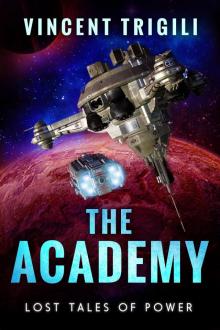 The Academy
The Academy Glimpses
Glimpses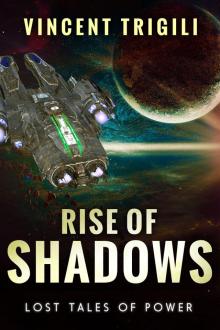 Rise of Shadows
Rise of Shadows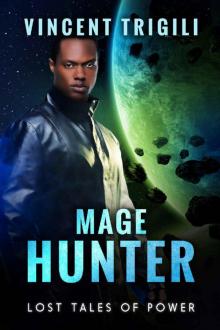 Mage Hunter (Lost Tales of Power Book 8)
Mage Hunter (Lost Tales of Power Book 8)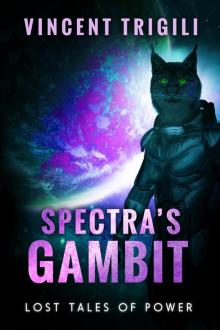 Spectra's Gambit
Spectra's Gambit The Sac'a'rith
The Sac'a'rith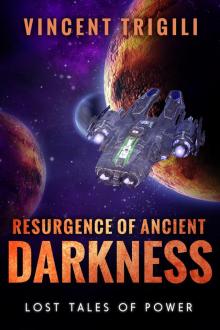 Resurgence of Ancient Darkness
Resurgence of Ancient Darkness